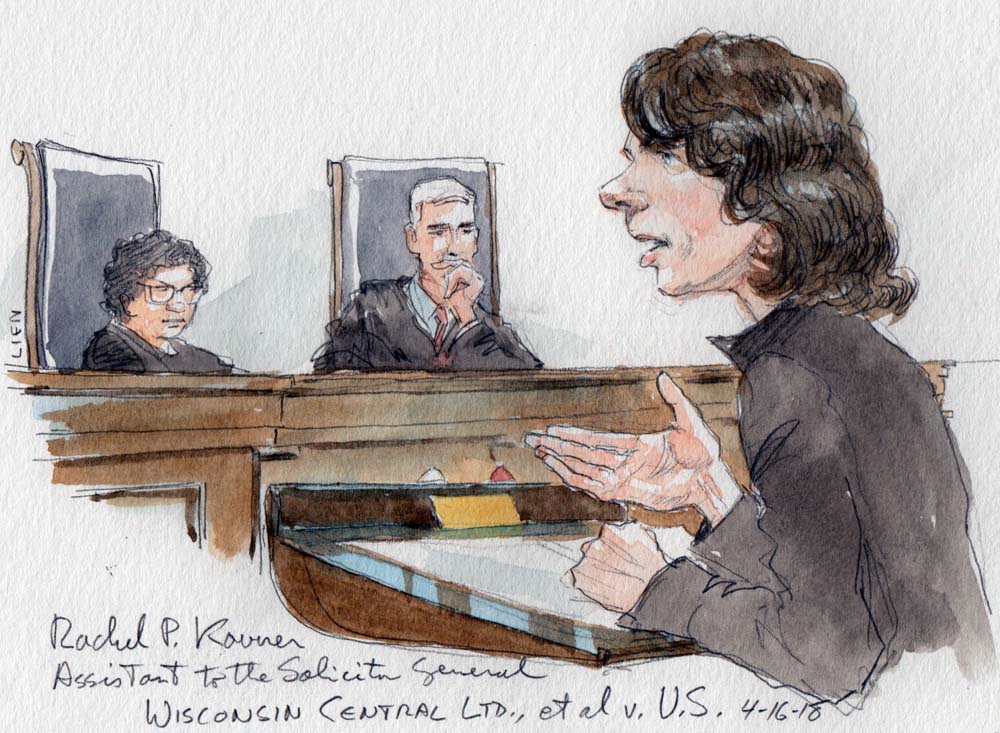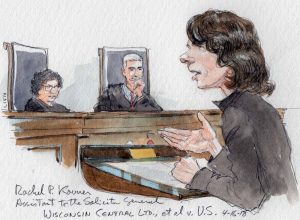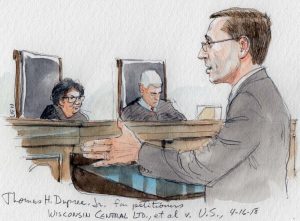Argument analysis: : Justices grapple with what counts as “money”

on Apr 16, 2018 at 11:13 pm

If anyone in the courtroom had forgotten that tomorrow is the deadline for filing federal income tax returns, Thomas Dupree, counsel for the petitioners in Wisconsin Central Ltd. v. United States, was there to alert spectators to their tax obligations. “Tax Day is almost upon us,” Dupree noted in his concluding remarks. And in case you were inclined to try, Dupree reminded listeners that the IRS “requires that we taxpayers pay our taxes in money. It will not let taxpayers pay their taxes in stock.”
That, of course, does not resolve the question presented in Wisconsin Central, which is whether the Railroad Retirement Tax Act requires railroads and their employees to pay taxes on stock-based compensation. And if the justices had reached a consensus on that question by the end of oral argument, they certainly didn’t show it. But they did lead the advocates through a series of colorful hypotheticals involving bottles of wine at Christmas, barrels of wheat on a Chicago commodities exchange and tickets to a Major League Baseball game.
Batting leadoff was Dupree, who represents three subsidiaries of the Canadian National Railway Company that are suing the United States for a $13 million tax refund. Dupree’s apparent strategy was to frame this as a case about a single word: “money.” The RRTA, enacted in 1937, imposes a tax on “compensation,” which is defined as “any form of money remuneration paid to an individual for services rendered as an employee.” Dupree argued that the RRTA’s definition of “compensation” does not apply to stock options granted to railroad employees because “[s]tock is not money.”
But in the early innings, Dupree faced pushback from members of the bench who argued that the case isn’t so easily resolved on the basis of plain language. “It’s not just that we have to give meaning to the term ‘money,’” noted Justice Elena Kagan. “[T]he term we have to look at is ‘money remuneration.’” Kagan then offered the example of two employees—one who makes $200,000 in cash plus $5 million in stock-based compensation, and one receives $250,000 in cash with no stock. Kagan asked Dupree: “Now who makes more money?”
Dupree appeared to concede that “in the context of that question,” it would be “fair” to say that the employee who receives $5 million in stock is the one who makes more money. But he added that “in the context of this tax statute,” the meaning of “money” is narrower. If “money remuneration” means any remuneration, Dupree asked, why would Congress have added the adjective “money” at all? “That wouldn’t make sense,” he said.
The justices then spent much of the rest of the argument trying to make sense of what is “money” and what is not. “I agree with you,” Justice Sonia Sotomayor told Dupree, that “a bottle of wine at Christmas is not.” What about baseball tickets? Sotomayor and Dupree both seemed to agree that those wouldn’t be taxable under the RRTA either. Dupree then went on to note that “[i]f I have two tickets to the Nationals and Rockies game, I can sell those and change those into cash a lot faster than I could find a broker and sell my shares of stock on a market.” (And indeed he probably could, because Justice Neil Gorsuch—whose hometown allegiance is to the Colorado Rockies—sat steps away.)
When Rachel Kovner, an assistant to the solicitor general, stepped up to the plate for the government, she faced her own set of hypotheticals. Chief Justice John Roberts asked: “What about … bushels of wheat?” That might not count, said Kovner, because “the employee who receives a bushel of wheat in their compensation, if that were to occur, can’t readily convert it into cash in the same way that they can convert an option.” Pressing further on the wheat line of questioning, Roberts asked about a voucher entitling the employee “to buy 20 bushels of wheat on the commodity exchange.” Kovner agreed that wheat vouchers would be closer to the line, noting that a 1938 regulation interpreted “money remuneration” to include merchandise orders that could be exchanged for goods at the company store.
Kagan then asked whether the wheat-voucher hypothetical might be easier “if a company said you can take a bushel of wheat or its equivalent in cash value.” “Yes,” said Kovner, adding that Kagan’s example is “more analogous” to the case at hand, “where essentially the employee can check a box on a form” and consummate an “essentially instantaneous conversion” of the stock options into cash. Kovner also reminded the justices that stock and stock options are “a predominant medium of exchange now in many corporate contexts and employee compensation matters.” To exclude stock-based compensation from taxation under RRTA would, she suggested, open quite a large loophole in the railroad tax scheme.
Kovner went on to emphasize some of the strange consequences that would arise if stock-based compensation is not taxed under RRTA. Non-railroad employers and employees pay Social Security and Medicare taxes on stock options like the ones at issue here. Railroads and their employees don’t pay Social Security and Medicare taxes under the same statutes but are taxed under the RRTA instead. “[I]t’s not uncommon,” Kovner noted, “for a CEO to get $1 in cash and the rest of their payment in stock.” Why would Congress want the railroad CEO to be exempt from taxes that other executives face? Then there would be “nothing to stop” a railroad from converting all compensation for high-level executives to stock or stock-option form, according to Kovner.
To be sure, that strategy won’t allow railroad executives to escape tax entirely. On the federal income tax (as opposed to railroad retirement tax) returns due tomorrow, individuals generally must report gains from the exercise of stock options as income—regardless of whether they work for a railroad or any other employer. And remember: You can’t pay your tax with stock. Or, for that matter, with bottles of wine, bushels of wheat or tickets to the Nats-Rockies game.




